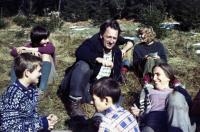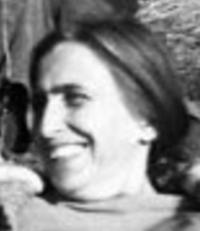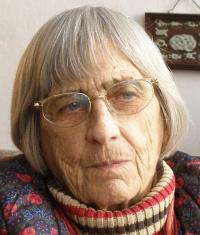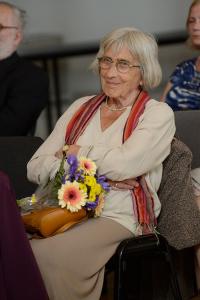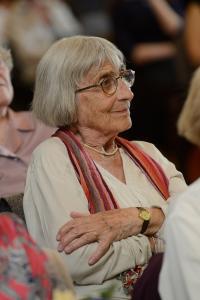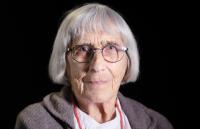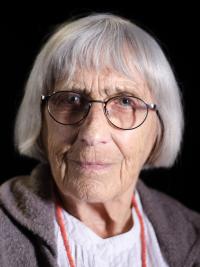“Well at the beginning we were afraid of course, so we just called and didn’t meet in flats as we used to do, we had an agreement that anyone with a larger flat to enough people to meet up, we continued making the prints, which Pavel was copying, the weekly and monthly programs. So that´s what we kept doing. We read the poets and had passwords related to the meetings, and... what we shall prepare for the next time, what we should read. But when Pavel got locked up, I think for about half a year we simply didn’t meet at all. Because I gave birth in March, and was pretty busy back then.., and so we tried to orient yourselves also... mm, we said to ourselves: Well we have to do it somewhere, not still live just for ourselves. So we used to attend Kozák´s lectures, he taught at the philosophical faculty so we were talking about such stuff, where something exists, where we could listen to each other, to other thoughts. So we as non-students could come too, so we used to switch and I even left my child alone at home... My need to go and listen to some thoughts, to something that will last, was so strong. So we tried to get as much as possible, we gleaned, so that we didn’t meet and cause no hassle... we simply wanted to be somewhere like... where they could catch us simply, so we only messaged amongst each other, what is where, about concerts or about readings and so on. We simply stopped meeting up for some time totally.”
“But they always came with the same argument: ‚You know, what shame it will be? When you have a baby after nine months there?‘ ‚Well, in the club?‘ ‚Well, amongst those people the course ones.‘ And they were strongly against us. So I reckon we didn’t played the role or we didn’t have any, it was quite spontaneous, as Miloš Zapletal caused it (laughing), Miloš Zapletal is a kind of a nudger, you know, he always comes: How comes you are not doing this? Why didn’t you write... But when I invite him, he never comes as he has simply... he´s a free spirit. He did a lot of work, that´s wonderful, I respect him a lot but myself I could not cooperate with him. He is a completely different type. Well back then he came, but that was only in 1990... But he led the group well and ours was on good terms with theirs, also Nevrlý did that, if you know anything about him, he wrote lovely stuff about Jizerské mountains, he is a wonderful man, and you should also interview him. He is not much of a scout, but a very innermost person, but also very ill not and not willing to travel anywhere anymore... But you could visit him and you would see Miloš, he is quite... He will be hesitant, and not willing to talk, saying he is not famous, I will not tell you anything and so on... Well back then he came and we lived together intensely at the time all of us in the course and we used to go to our cottage in Smržov, and he came and said: ‚Here you have quite a large estate, waiting for something, should you not run a course here?‘ I replied? ‚Come on, I don’t think of a course, I don’t need any of that, I got children here and grandchildren too.‘ ‚Well you just got to do something‘, and he wanted to promote there will be a course in Smržov no. 3. I said: ‚ Ok that is no problem to give them a bed to sleep in and feed them, I see no problem there, but I don’t know what role I should play, as I got no ambitions to tell anyone anything or just preach. I live as a private person... Well and he announced the date he set up everything and we all waited put on our scouts shirts: ‚I am curious, who comes here.‘ And they were given instructions to come on bike, so they gathered gradually, and each wore a different colour of a shirt and different kinds of pants and I was terribly scared, thinking: Jesusmaria, there will be fifteen or twenty people here... and how shall they survive in such conditions, with only one bathroom, a single toilet, a family here too, all together. So I reckoned, I managed a lot already, a large camp also, so we´ll just figure it out. And then they began to look like quite a sympathetic folks, so we sat down and began normally talking. They were expecting a drill or something, so of course there was none of that. (Which year was it?) The first year of those Fons, the first grade just after the revolution, so it was not just the first year but the second following the revolution, in summer, in 1990… maybe even 1991. I really cant say for sure and have to look it up. We didn’t expect anything of it any said: Let’s try it, when Miloš has an idea, so let’s do it. He also he invited someone, as it was a large organization, which lasted all through the regime, the man from Lipnice! (Holiday school in Lipnice.) From Lipnice he invited people, who would work, as we could not make a program of interesting games, and we have never done that, so he said, I will also invite two couples from Lipnice... Now I had to get the bed to sleep on and resolve everything. So finally it was really a wonderful week, I got to say. Mostly they were boys, but also girls, they accept the conditions, and when it was about to end, they asked a question, we made a fire, where the local scouts had a club room, we made a fire to say goodbye and we were glad we spent the week together and they came with an idea: Well and how about a continuation? Yeah, just as simple as that. Next time we will definitely meet up again, in a year, right... This just can´t end, it was wonderful, that it could not finish. So we got a task to think, what will be next.”

